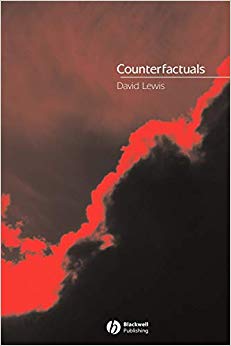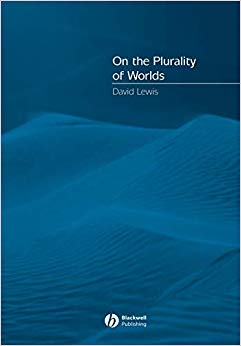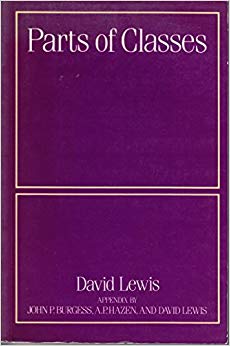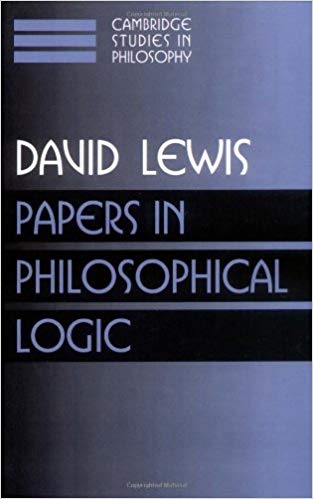Background
David Lewis was born on September 28, 1941, in Oberlin, Ohio, United States. He was a son of John D. Lewis and Ruth Ewart Kelloggs Lewis.

281 N Pleasant St, Oberlin, OH 44074, United States
Oberlin Senior High School where David Lewis studied.
500 College Ave, Swarthmore, PA 19081, United States
Swarthmore College where David Lewis studied.
Oxford OX1 2JD, United Kingdom
The University of Oxford where David Lewis studied from 1959 to 1960.
Harvard University, Cambridge, MA, United States
Harvard University where David Lewis received his Doctor of Philosophy degree.






(Counterfactuals is David Lewis' forceful presentation of ...)
Counterfactuals is David Lewis' forceful presentation of and sustained argument for a particular view about propositions which express contrary to fact conditionals, including his famous defense of realism about possible worlds.
https://www.amazon.com/Counterfactuals-David-K-Lewis/dp/0631224254/ref=sr_1_1?keywords=Counterfactuals+David+Lewis&qid=1576585010&s=books&sr=1-1
1973

(This book is a defense of modal realism; the thesis that ...)
This book is a defense of modal realism; the thesis that our world is but one of a plurality of worlds, and that the individuals that inhabit our world are only a few out of all the inhabitants of all the worlds. Lewis argues that the philosophical utility of modal realism is a good reason for believing that it is true.
https://www.amazon.com/Plurality-Worlds-David-K-Lewis/dp/0631224262/ref=sr_1_1?keywords=On+the+Plurality+of+Worlds+David+Lewis&qid=1576585092&s=books&sr=1-1
1986

(Does the notion of part and whole have any application to...)
Does the notion of part and whole have any application to classes? Lewis argues that it does, and that the smallest parts of any class are its one-membered "singleton" subclasses. That results in a reconception of set theory. The set-theoretical making of one out of many is just the composition of one whole out of many parts. But first, one singleton must be made out of its one member - this is the distinctively set-theoretical primitive operation. Thus set theory is entangled, with mereology: the theory of parts and wholes.
https://www.amazon.com/Parts-Classes-David-K-Lewis/dp/063117656X/ref=sr_1_1?keywords=Parts+of+Classes+David+Lewis&qid=1576585781&s=books&sr=1-1
1991

(This is the first of a three-volume collection of David L...)
This is the first of a three-volume collection of David Lewis' most recent papers in all the areas to which he has made significant contributions. This first volume is devoted to Lewis' work on philosophical logic from the past twenty-five years. The topics covered include: deploying the methods of formal semantics from artificial formalized languages to natural languages, model-theoretic investigations of intensional logic, contradiction, relevance, the differences between analog and digital representation, and questions arising from the construction of ambitious formalized philosophical systems.
https://www.amazon.com/Papers-Philosophical-Logic-Cambridge-Philosophy/dp/0521587883/ref=sr_1_1?keywords=Papers+in+Philosophical+Logic+David+Lewis&qid=1576585816&s=books&sr=1-1
1998
David Lewis was born on September 28, 1941, in Oberlin, Ohio, United States. He was a son of John D. Lewis and Ruth Ewart Kelloggs Lewis.
David Lewis attended Oberlin Senior High School. Later he studied Chemistry and Philosophy at Swarthmore College. Lewis also studied at the University of Oxford from 1959 to 1960. He graduated from Swarthmore College in 1962 and then entered Harvard University where he received a Doctor of Philosophy degree in 1967.
David Lewis started his career as an Assistant Professor of Philosophy at the University of California in 1966. He held this post until 1970. In 1971, he took up a post of an Associate Professor of Philosophy at Princeton University. In 1973 he was made full Professor and held this post until his death. Lewis was named Stuart Professor of Philosophy in 1995.
David Lewis published his first book Convention: A Philosophical Study in 1969. Later he wrote such books as On the Plurality of Worlds, Parts of Classes and Papers in Philosophical Logic. Lewis also wrote numerous articles for such journals as the Journal of Philosophy and American Philosophical Quarterly.
David Lewis was an American philosopher, educator and writer who was famous for his works devoted to analytical philosophy. He was one of the most respected representatives of analytical philosophy. His most famous books are On the Plurality of Worlds, Parts of Classes and Papers in Philosophical Logic.
David Lewis received the Matchette Prize for his book Convention: A Philosophical Study. He also received the Princeton’s Howard T. Behrman Award. In 2006, the Department of Philosophy at Princeton University began a series of lectures in his name.
(Counterfactuals is David Lewis' forceful presentation of ...)
1973(This book is a defense of modal realism; the thesis that ...)
1986(Does the notion of part and whole have any application to...)
1991(This is the first of a three-volume collection of David L...)
1998David Lewis was a materialist and a reductionist, arguing that states of the mind are simply states of the brain, functionally conceived. He said that science at its best provides an accurate account of a mind-independent world, though at the inevitable cost of revealing little of the world’s intrinsic nature.
According to Lewis, our world is one of the infinitely many worlds, each a self-contained universe, unconnected to this world or to any other. Every possibility – every possible course of history in all its rich detail, every possible variation on each one of us – is realized somewhere in this vast space of worlds.
Quotations:
"We can imagine the impossible, provided we do not imagine it in perfect detail and all at once."
"In learning how to imagine x, you gain abilities; later you have all the relevant imaginative abilities you had before, and more besides. and you notice, a priori, relationships of coherence or incoherence between attitudes that might figure in the realisation of x; later you are aware of all that you had noticed before, and more besides. and you think of new questions to explore in your imagining...and later you have in mind all the questions you had thought of before, and more besides."
David Lewis was a member of the Philosophy Department at Princeton University. He also was a fellow of the American Academy of Arts and Sciences, and a corresponding fellow of the British Academy.
David Lewis was a legendary teacher who was famous for his firm but gentle criticism and breathtaking clarity of mind. He always helped his students to develop new ideas and contribute to the subject.
David Lewis married Stephanie Robinson in 1965.
